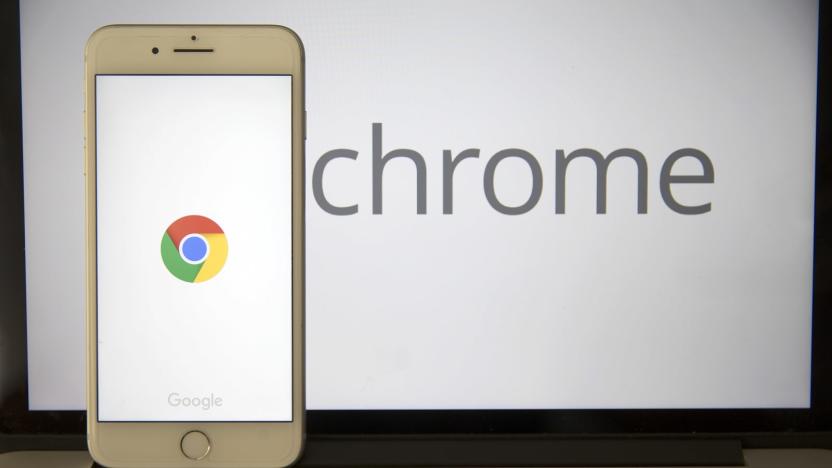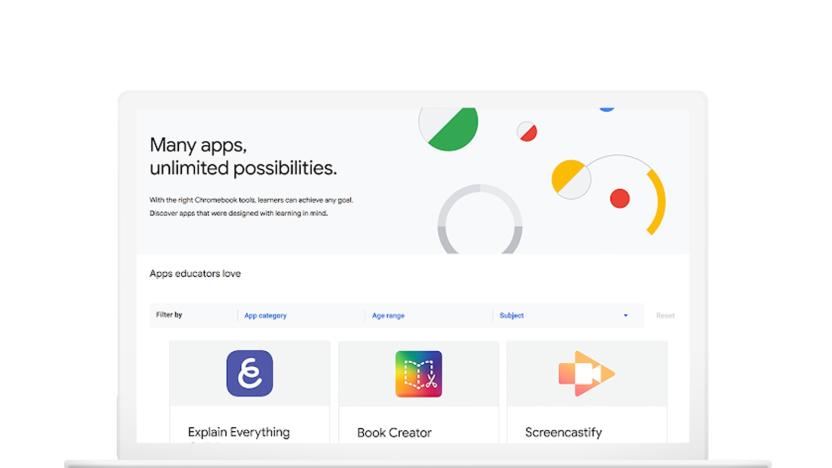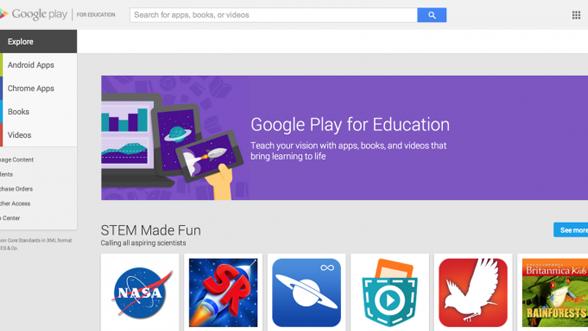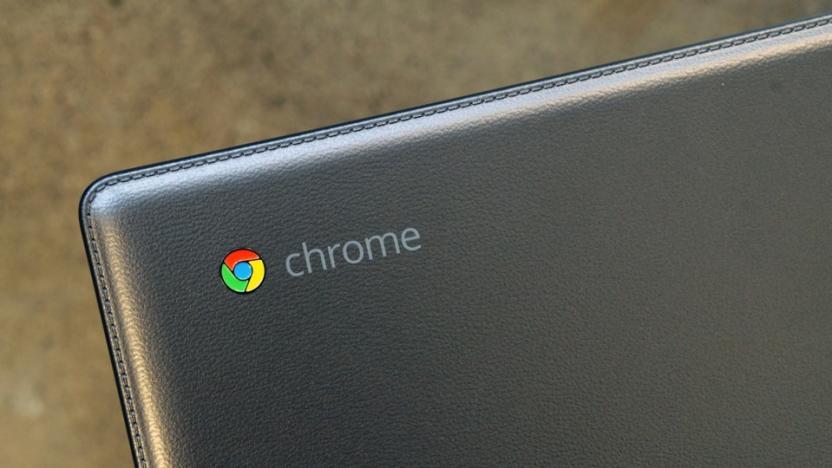Chrome OS
Latest

Chrome now supports your PC's media keys
Chrome is finally ready to make use of your keyboard's media buttons. Google has released the polished version of Chrome 73, and its centerpiece is support for the media keys on many newer PC keyboards. You'll need a Mac, Windows or Chrome OS system (Linux is coming later), but this will let you pause a web video even when the browser is in the background. We could see this causing problems if you regularly leave a media app open, but it could be immensely valuable if you treat YouTube like a jukebox or just have to dash off in a hurry.

Chromebook App Hub gives teachers ideas for class activities
Many schools use Chromebooks, but they might not always know how to make the most of those systems in the classroom -- and Google knows it. The firm is launching a Chromebook App Hub that will both help teachers find activity ideas and connect institutions with developers that might fit their needs. Educators can both create and look for "idea sparks" and apps based on the age range, subject, idea category and even specific learning goals.

Viber's calling and messaging app launches on Chromebooks
In order for Chrome OS to succeed, Google needs all the support it can get from developers. Hardware companies are certainly doing their part, namely by offering Chromebooks to people at affordable prices. That's why it's important when a popular service such as Viber launches on the platform, like today. Now users can start using the app to communicate with friends or family directly from their Chromebook, just as they would on iOS, Android or Windows Phone. Not only can you send text and picture messages, but also make phone and video calls to your contacts. It's free too, which comes in handy if you're trying talk to people across different countries.

Chrome OS gets a new launcher and more Material Design
Early adopters have had access to a redesigned Chrome OS launcher since last month. Now, Google is making that feature available to all users of its web-based operating system. Today's fresh, stable update to Chrome OS also comes packed with a number of Material Design elements, bringing a new look to the Files app and the default typeface. Just as well, there's an updated calculator app, support for password-protected zip files -- plus, of course, the customary bug fixes and security revisions. So expect to see changes the next time you boot up your Chrome OS machine, some visible, others not so much. Either way, rest assured they are for the better, especially the Google Now-equipped Chrome Launcher 2.0.

Google now rewards Chrome bug hunters all year round
One way to reduce the number of bugs or exploits in your software is to throw it open to some of the best and most devious minds in the industry and ask them to pull it apart. That's what Google has done with its annual Pwnium conference, where it's rewarded researchers with millions of dollars in Chrome-based security bounties. However, the search giant has decided now is the time to do things a little differently. As of this week, the Pwnium competition is shifting from an annual affair to a "year round, worldwide opportunity for security researchers."

A tale of two Chromebooks: one size doesn't fit all
I've been spending a lot of time with Chromebooks. About one a month for the last six months, if my math is correct. Lately, though, I've found myself in the somewhat unusual situation of testing two models at once. Two very different models, I should add. On the one hand, we have the Toshiba Chromebook 2, which brings a full HD, 1080p display and a relatively big 13-inch screen. At $330, it's a good deal compared to similar machines, but it's also on the pricier end for a laptop that basically just runs the Chrome browser. On the other, we have Samsung's newest laptop (also called the Chromebook 2), which has a smaller size and also a smaller price: just $250. But the design is nice and in a way, so is the keyboard. So what matters more, then? A dazzling screen or a faux-leather lid? Robust audio or being priced to sell? Check out our two reviews (Samsung and Toshiba) and decide for yourself. [Image credit: Will Lipman]

Toshiba Chromebook 2 review: great screen, but the battery life takes a hit
Competition is a beautiful thing. When Samsung first came out with its 13-inch Chromebook 2 earlier this year, it quickly became one of our favorite budget laptops, mostly because it was the only Chrome OS device with a sharp, full HD screen. Even so, it was hardly perfect: Its performance could have been faster; it was missing a full-size SD slot; and, at $400, it was kinda pricey too. Here's where that competition thing comes in. First Acer released something similar at a lower price, and now Toshiba is selling a full HD Chromebook of its own, also called the Chromebook 2. While it matches Samsung pixel for pixel, the price is also a good deal lower: just $330 for the top-of-the-line model. But let's not judge a machine purely by its spec sheet, shall we? How does the new Chromebook 2 actually perform? There was only way to find out: Use it as my primary laptop for a week.

Schools in the US love Google Chromebooks
When it comes to the Chromebook, Google isn't shy about its beliefs that it is the perfect computing device for education sectors around the world. And here in the US, schools and students have started to feel the same way. In a blog post, where it highlights different ways in which educational institutions in California are using Chromebooks, Google pointed out that recent IDC numbers have its line of computers as being the best-selling device in K-12 education. The report takes into consideration laptops and tablets, so this is a notable achievement for the technology company.

Acer Chromebook 13 review: long battery life, sharp screen, good price
After years of getting little respect, Chromebooks are finally on the rise (at least in schools), which means every major PC maker is trying to get in on the action. That includes chip makers too, like NVIDIA. Though the company previously shied away from Chrome OS devices, it's now pledging to power a whole range of different Chromebooks with its Tegra K1 chip, each of them promising long battery life and more graphics muscle. The Acer Chromebook 13 is the first of the bunch, and while some of you might be Chromebook'd out, we were actually excited. Here was a $300 laptop boasting at least 11 hours of battery life, a 1080p display option and enough horsepower to clobber Intel at things like gaming and rich websites. As it turns out, it was all just a little too good to be true.

Toshiba intros a slimmer Chromebook, budget Windows convertible
Toshiba isn't showing off a whole lot here at IFA, Europe's biggest trade show. That said, the stuff it has announced at least manages to run the gamut. Today, for instance, the company unveiled both a slimmed-down Chromebook 2 and the Satellite Radius 11, a small-screened Windows convertible. Starting with the former, the Chromebook 2 has the same 13-inch screen size as its predecessor, along with the same textured plastic design. This time, though, it's thinner and lighter, at 2.95 pounds, with the sort of compact dimensions you'd expect to find on a 12-inch system. Toshiba bumped up the resolution too, so that you can now get it with a 340-nit, 1,920 x 1,080 IPS panel (the base model still has a 1,366 x 768 display). Depending on the resolution, you can expect either 11.5 hours of battery life on the lower-res version, or nine hours with full HD. In addition, Toshiba added Skullcandy audio. The firm seems proud of it, but after a few minutes of hands-on time, I actually found the sound to be rather tinny (it is loud, though).

ASUS C200 review: The company's first Chromebook is a battery life champ
Sorry, naysayers: You're going to see a fair number of Chromebook reviews from us over the next few months. That's mostly because sales of these inexpensive laptops have shot up -- which means everyone and their mother is now making one, even companies that had previously shied away. The latest brand to join the fray is ASUS, which already has loads of experience building small, cheap notebooks. Indeed, ASUS' 11-inch C200 Chromebook ($250) looks like a 2009-era EeePC brought back to life: The spacious keyboard feels eerily familiar, as does the long, 11-hour battery life. Even so, it's not a perfect machine by any means -- in fact, it has a pretty serious flaw -- but if you're in the market for a Chromebook, it couldn't hurt to consider a company that seems to know what it's doing.

Acer's Chromebook 13 lasts a stunning 13 hours on a charge
Until now, if you wanted a Chromebook with a full HD display, you only had one option: the 13-inch Samsung Chromebook 2. Want epic battery life? Yep, all roads lead to Samsung there, too. Well, not anymore, anyway. Acer just announced the Chromebook 13, and it matches Samsung nearly spec for spec with an optional 1080p display and NVIDIA's quad-core Tegra K1 chip, promising up to 13 hours of runtime (details on that after the break). This is interesting for two reasons. First off, although this is essentially the same class of product as what Samsung is selling, it costs $100 less: $299, versus $400 for the Chromebook 2. Sounds good, right? What's more, this is the first-ever Chrome OS device with an NVIDIA processor inside.

Acer C720 review (Core i3): a more powerful Chromebook
Whether rightly or wrongly, Chromebooks have earned a reputation for being the new netbooks. Slowly, though, things are starting to change. The designs are starting to feel less cheap -- at least if you're Samsung. Battery life is getting longer, sometimes even better than on full-fledged laptops. And now, performance is getting stronger, too: Acer just became the first company to release a Chromebook with a Core i3 processor, one that can better withstand multitasking, gaming and whatever rich websites you're likely to visit. The C720, as it's called, is actually the same 11-inch Chromebook Acer's already been selling, just with a beefier CPU inside, and theoretically longer battery life -- 8.5 hours, up from 7.5. As ever, though, Acer kept the price down: This guy starts at just $350, just a little more than what you'd pay for a much lower-powered system from some other brands. The question is: Does processing power trump everything else? And if it does, are you better off waiting for other Core i3 models to come out?

Google experimenting with major redesign of Chrome OS
Google has made attempts in the past to unify the design of its various properties with varying degrees of success. Material Design, which is major part of the upcoming Android L release, may be its most coherent effort to date. The new look is expected to touch every corner of Google's catalog, and Chrome OS will be part of that revamp. A screen shot posted by Chromium evangelist François Beaufort on Google+ shows the very early fruits of Athena, an effort to "bring a new kind of user experience" to Mountain View's desktop OS. The image shows windows with minimal controls and decoration in a stacked card view, similar to the app switcher revealed as part of the next Android update. There's also what appears to be a launcher bar with a search field at the bottom of the screen. While the redesign is clearly in the very early stages, you can see the important elements of Material Design at work. Everything is flat and paper like, but exists in a three-dimensional space, complete with less-than-subtle drop shadows. You can compile a copy of Chromium OS yourself to give Athena a test run, but we'd hold out for a more complete version.

Google Play for Education comes to student Chromebooks
If Google really is on a quest for global domination, as some folks loudly proclaim, then it's wisely starting its efforts in the classroom. In addition to attracting schools to its Chrome OS platform, via low-cost Chromebooks, it's now also offering them access to the "Google Play for Education" hub through those devices. This hub contains apps, books and videos that are especially tailored to kids plowing through their primary and secondary education in the US, and it was previously only available to those who had a school-provided Android tablet.

Google's new 'Material Design' UI coming to Android, Chrome OS and the web
Google's annual I/O developer keynote has only just begun, but already we're being treated to some of its announcements. In a bid to create a new "visual language" for users, Google is taking the design of its Android, Chrome OS and web properties back to basics with its new "Material Design." According to Google, Material Design is intended to make better use of available space, and bring a consistent user experience whether viewed on a smartphone, tablet or desktop. Google's apps will be updated to reflect this change, as you may have seen in early Gmail and Calendar app leaks and in the latest version of the Google+ app on Android.

Samsung Chromebook 2 review: A $400 laptop never looked so good
Chromebooks seem to be having a moment. Which is odd, because for a while there, nobody seemed to be giving them a chance. Since the first Chromebook came out, about three years ago, Chrome OS devices have gotten flak for not being able to do as much as Windows machines. And to be fair, they couldn't, especially in the beginning. Manufacturers responded by slashing prices, but that led to a whole other problem: endless netbook comparisons. Indeed, many Chromebooks until now have been small, dirt-cheap and woefully low-end. To be avoided, mostly. Lately, though, the tides have been changing. Nearly every PC maker is making a Chromebook, if not several, and many will soon be upgrading their models with heavier-duty Intel Core i3 CPUs -- processors so powerful you might actually consider a Chromebook for your next laptop. Samsung, meanwhile, is taking a different approach: It's decked out its new 11- and 13-inch Chromebook 2 laptops with a stylish faux-leather lid, similar to what it did on the high-end Galaxy Note 3 and Galaxy Note Pro. Samsung also went with a full HD screen on the 13-inch model, making it the only notebook I know that's this cheap with this nice a display. With a starting price of $320 ($400 for the 13-incher), the Chromebook 2 is on the pricey side, but then again, you're paying for better quality. So is it worth it?

Chrome OS gets better organized with latest update
The Chromebook revolution is here and, naturally, Google is doing everything it can so that these devices keep improving even as time goes on. As such, the search giant today revealed some new things rolling out to Chrome OS laptops and desktops, including support for folders within the launcher and the ability to use hands-free voice commands (aka "OK, Google") in English. What's more, this new version of the OS, released through the Chrome stable channel, brings back the minimize button, with Google stating that it listened to your feedback and knew you really wanted the feature to be part of the window controls. Unfortunately, not all Chrome OS devices will get this -- namely, the ASUS Chromebox and Samsung Series 3 Chromebox. Google didn't say whether the update will ever come to the omitted Chromeboxes, but we'll let you know if anything changes.

ASUS plans new smartphone and Chromebook launches for early 2014
ASUS' bread and butter is in the PC business, so as growth dwindles, it's got to reinvent itself elsewhere. According to the Taipei Times, the company is set to introduce its first line of Chromebooks and a number of new smartphones early next year. We'll likely see new handsets at CES 2014 in January, possibly including the 5-inch MeMOFone, followed by new 11.6-inch and 13.3-inch Chrome OS-powered notebooks (said to be priced at $199 and $249 respectively) later in the quarter. ASUS previously teased Haswell Chromebooks at Intel's Developer Forum in September, where it also showed off its new lightweight Chromebox PC. Further down the line, ASUS will become the latest entrant into the wearable market -- we'll apparently get to see what it's been working on at Computex in June.

HP Chromebook 11 review: is this $279 Chrome OS laptop really for everyone?
We've seen Chromebook prices get cheaper and cheaper, but the majority opinion appears to remain the same: they're nice laptops in theory, but they don't cut it in the real world. Interesting, then, that Google's marketing the new HP Chromebook 11 as the laptop "for everyone." One thing that we think almost everyone can agree on: $279 for a well-designed, 11.6-inch notebook with a bright IPS display is a none-too-shabby deal. But, given the limitations of Chrome OS, is this actually a worthwhile purchase?






